IOS organises lecture on medical ethics in Islam
December 20, 2014 at IOS Conference Hall
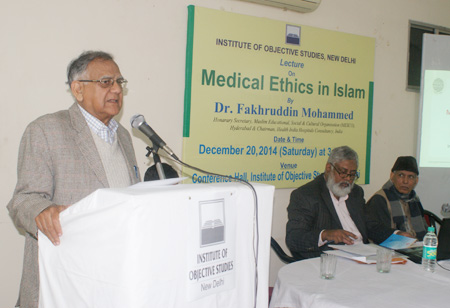
Prof. Z. M. Khan, Secretary General, IOS introducing the theme
A lecture on medical ethics in Islam was organised by the Institute of Objective Studies (IOS) at its Conference Hall here on December 20, 2014. Delivering the lecture, Honorary Secretary, Muslim Educational, Social and Cultural Organisation (MESCO), and Chairman Health India Hospitals Consultancy, Hyderabad, Dr. Fakhruddin Mohammad said that medical ethics was an integral component of the profession and the Islamic character and principles of a Muslim medical professional made it more steadfast and imbibe piety. He defined medical ethics in Islam as good character and talked about its practice, duties and responsibilities. He also explained how to maintain good practices, provide quality assurance, follow and ensure legal obligation, duties towards patients, colleagues, attendants (relatives), society, human rights, etc.
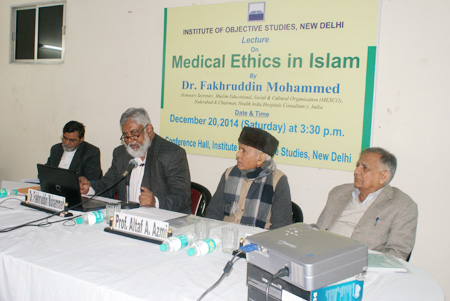
Dr. Fakhruddin Mohammad presents his presentation (PPT)
Dr. Fakhruddin Mohammad noted that Islamic medical ethics took shape gradually from the seventh century and developed by the eleventh century. He maintained that by the 15th century it was amalgamated from the Quran, Sunnah, Shariah and Fiqh. It was also influenced by pre-Islamic Arabic, Persian and Greek practices. He said that medical ethics could be classified as drugs, medical peer review etc. Elucidating further, he said that ethics, sometimes known as moral philosophy, was a branch of philosophy that involved systematising, defending and recommending concepts of right and wrong conduct, often addressing disputes of moral diversity.
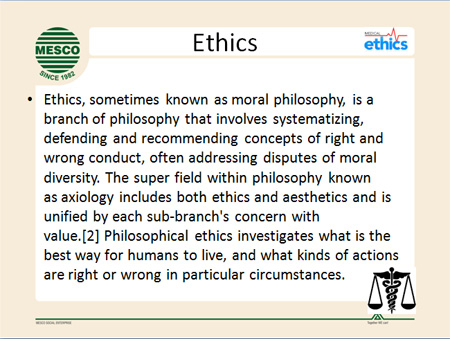
A slide from PPT
The field within philosophy known as axiology included both ethics and aesthetics and was unified by each sub-branch's concern with value. He opined that medical ethics was a system of moral principles that applied values and judgments to the practice of medicine. As a scholarly discipline, medical ethics encompassed its practical application in clinical settings. Referring to the history of Western medical ethics, he said that it could be traced to the guidelines on the duty of physicians in antiquity such as the Hippocratic Oath and early Christian teachings. The first code of medical ethics, "Formula Counties Archiatrorum", he added, was published in the 5th century, during the reign of the Ostrogothic King Theodoric the Great.
In the medieval and early modern period, the field was indebted to Muslim medicine such as Ishaq ibn Ali al-Ruhawi, who wrote the Conduct of a Physician, the first book dedicated to Islamic medical ethics and Muhammad ibn Zakariya ar-Razi (known as Rhazes in the West), Jewish thinkers such as Ibn-e-Maimun (Maimonides), Roman Catholic scholastic thinkers such as Thomas Aquinas, and the case-oriented analysis of Catholic moral theology. He said that these intellectual traditions continued in Catholic, Islamic and Jewish medical ethics.
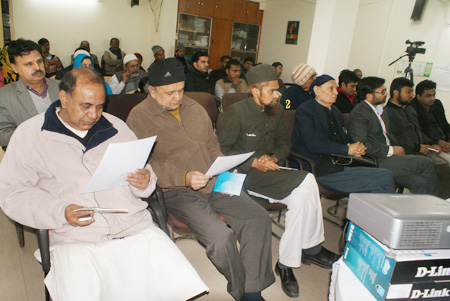
A view of audience
Tracing the history of Islamic medicine, Dr. Mohammad observed that it passed through three main phases. The first phase saw collection and translation of existing knowledge during the seventh century. While the original research and practices by Muslim physicians responded with new procedures, invention and discoveries in the second phase, the 14th century witnessed preservation of large volumes of phenomenal work of Muslim physicians in the third phase. He said that several bodies had prescribed oath for physicians, which included sincerity, proper diagnosis, every effort to save the patient from diseases, etc. Describing medical profession as a wholesome and noble profession, he said that in the present times, several moral issues had come to the fore.
While noting that Islam made the medical profession moral, he regretted that Muslims did not take the lead in furthering research and modalities of treatment. Similarly, the West deliberately refrained from disclosing the contribution of Muslims to medical research for some 1000 years. He said that the outcome of that research was still relevant. "As practitioners of Islam, we believed in morality as our religion was based on morality", he pointed out. He maintained that the UN's body, WHO had come out with a medical code as well as oath to be taken by a physician. Similarly, Islamic Association of North America had prescribed the oath for Muslim physicians. Medical Council of India (MCI) had also come out with a declaration for practising physicians, he said. Underlining the importance of medical ethics, he said that it was going to be introduced as a subject of medical curriculum.
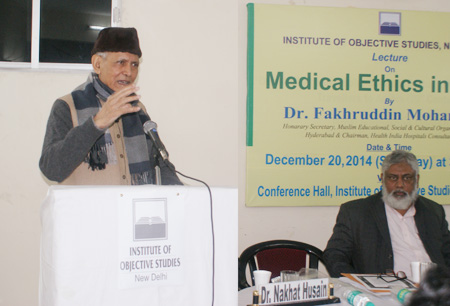
Prof. Altaf Ahmad Azmi delivers presidential remarks
Presiding over the function, Prof. Altaf Ahmad Azmi said that the 4th century BC physician Hippocrates was also a philosopher who compiled works on Greek medicine for the first time. But he restricted the knowledge of Greek medicine to medical doctors' families fearing that this could be misused. It was Hippocrates who rationalised the knowledge of Greek medicine and later allowed others to acquire it, but with a rider. It was offered to those who could swear that they would be patient, tolerant, moderate in decision-making and compassionate. It was in fact, a great revolution in medical history. Making a distinction between Western and Islamic ethics, he said that while the former believed in the physician as a healer, the latter believe that Allah is the Healer. He remarked that the works of Hippocrates translated in Arabic as Al-Mualijaat-al-Boqratiah, differed from the original Greek text. He referred to the first book on the conduct of physician written in India by Mulla Abdul Qadi Badayuni in 1590. This was Nijaturrashid written in Persian and hailed as a monumental work.
Earlier, the subject was introduced by the Secretary-General of the IOS, Prof. Z M Khan who informed that the lecture was part of a series of lectures planned during the Silver Jubilee celebrations of the IOS. As a follow-up to the decisions taken during the Silver Jubilee celebrations, several lectures on specialised subjects had been planned. He noted that so far 14 international conferences had been organised in different parts of the country on various issues. These conferences generated much interest among those who attended them, particularly youngsters. He expressed dismay that despite being a noble profession, medical profession was beset with unethical practices like commercialism, corruption, etc. It called for thorough enquiry and investigation. Islam is a repository of varied knowledge and need to be preserved. He said that the lectures being organised by the Institute would be published in book form.
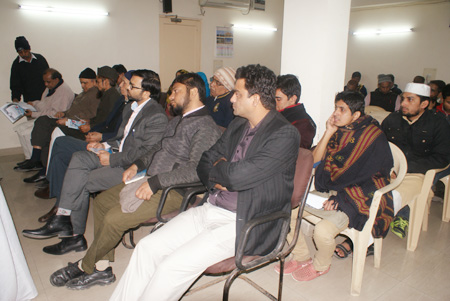
Another view of audience
The function began with the recitation of a verse from the Quran by Hafiz Mohammad Athar Husain. Dr. Nakhat Husain Nadvi compered the proceedings. Those who attended the function included Prof. Mohammad Mushtaq, president, The Origin, Mr. Sharique Nadeem, Mirza Zaki Ahmed Baig from Tameer-e-Millat Foundation, Research Scholar at Jamia Millia Islamia, Mr. Gowhar Quadir Wani, Asstt. Professor at Tibbia College, Mr. Shoaib Ahmed, Research Scholar at Tibbia College, Dr. Mohd. Shahabuddin and Dr. Mohd. Nauman Saleem, associate editor of the Urdu weekly, Chauthi Duniya, Mr. A.U. Asif, senior Journalist, Mr. Mohd. Zeyaul Haq, Asstt. Professor in the Faculty of Dentistry, Jamia Millia Islamia, Dr. Nafis Ahmad and Dr. Syed Ansar Ahmad, besides prominent citizens and social activists.
Go Back